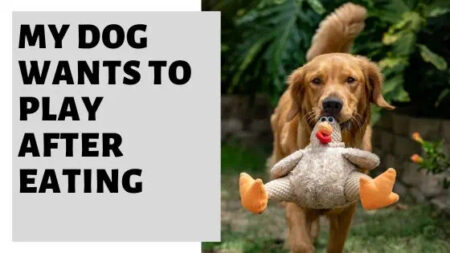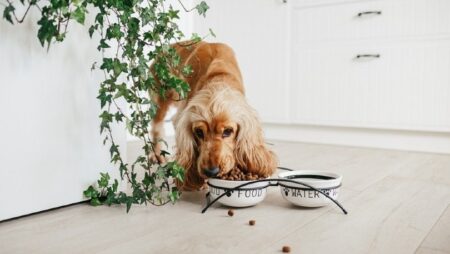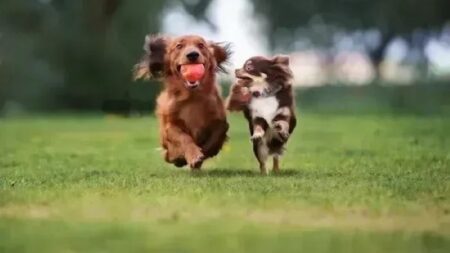Dogs are undeniably very playful and energetic creatures, often displaying a never-ending eagerness to play and engage in activities. However, it can sometimes be puzzling and even frustrating for dog owners when their furry companions want to play immediately after eating. This may leave many owners wondering why their dog is suddenly so enthusiastic and what they should do in this situation.
In this article, we will explore the reasons behind this behavior and provide some practical tips on how to handle it. So, buckle up as we dive into the topic of “My Dog Wants To Play After Eating: Why And What To Do.”
My Dog Wants To Play After Eating: Why And What To Do
There are a few possible reasons why your dog wants to play after eating:
- Natural Instinct: Dogs have an instinct to play after eating because it mimics the behavior of their wild ancestors. In the wild, dogs would eat their prey and then engage in playful activity as a way to bond with their pack members and expend excess energy.
- Food Coma: Just like humans, dogs can experience a “food coma” after a large meal. During this time, their bodies are digesting and using energy to process the food, which can leave them feeling lethargic. Playing helps them wake up and feel more energized.
- Digestion: Playing and exercise also stimulate digestion and help move the food through the digestive system. This can prevent bloating and discomfort that may occur after eating.
- Bonding: Dogs are social animals and playing with their owners is a way to strengthen their bond. After eating, your dog may see it as an opportunity to spend time with you and engage in fun activities.
- Boredom: If your dog is left alone for long periods, they may associate eating with the opportunity for attention and playtime. This can lead to them wanting to play after eating as a way to alleviate boredom and loneliness.
Can My Dog Play After Eating?
Generally speaking, it is not recommended for dogs to play right after eating. This is because eating and playing can both cause a dog’s stomach to become more active, and the combination of these two activities can lead to stomach upset, including vomiting and diarrhea. Additionally, vigorous activity right after eating can increase the risk of a condition called bloat, which is a serious and potentially life-threatening medical emergency. Therefore, it is best to wait at least an hour after feeding your dog before allowing them to play.
How Long Should A Dog Rest After Eating to Prevent Bloat?
Veterinarians recommend that dogs rest for at least an hour after eating to prevent bloat. This is because it takes the stomach about an hour to empty after a meal. During this time, the stomach can stretch, putting pressure on the nearby organs and causing the stomach to twist. This condition, known as gastric dilatation-volvulus (GDV) or bloat, is extremely dangerous and can be fatal if not treated immediately. Symptoms of bloat include restlessness, increased drooling, pacing, and abdominal swelling. If you notice any of these signs in your dog after eating, contact your veterinarian immediately.
Should You Play With A Dog After Eating?
As mentioned, playing with a dog right after eating is generally not recommended. However, this does not mean that you cannot engage in some low-impact activities with your dog after they have eaten. Walking at a slow pace or throwing a ball for your dog to fetch in the backyard are both safe and appropriate activities to do after feeding. Just be sure to avoid any vigorous activity, such as running or jumping, for at least an hour after your dog has eaten. By following this simple rule, you can help prevent your dog from developing bloat and ensure that they stay healthy and happy.
Why Does My Dog Act Weird After Eating?
After eating, many dogs may act weird or display odd behaviors. This is due to the change in their digestive system that occurs after eating. When a dog eats, the stomach releases hormones that tell the body to slow down the digestion process. This can lead to many changes in the body, including a decrease in blood pressure, a drowsy feeling, and a sense of fullness. These changes can make some dogs act sleepy or lazy, while others may become more active or restless. It is important to note that these behaviors are normal and not cause for concern.
The Risks Of Playing After Eating
There are a few risks associated with dogs playing after eating, including:
- Gastric Dilatation-Volvulus (GDV) or “Bloat”: This condition occurs when a dog’s stomach twists and fills with gas, causing a potentially life-threatening emergency. Playing after eating can increase the risk of GDV, as the physical activity can cause the stomach to twist.
- Choking: If a dog is playing vigorously after eating, they may not properly chew their food and could be at risk of choking on their food or getting objects stuck in their throat.
- Vomiting: Some dogs may get overexcited while playing and exert themselves, which can cause them to vomit. This can be especially dangerous if the dog has just eaten, as they may not have had enough time to properly digest their food.
- Stomach Upset: Playing after eating can also lead to general stomach upset or discomfort, including bloating, gas, and diarrhea. This can be uncomfortable for the dog and may require medical attention if it becomes severe.
- Ingesting Foreign Objects: While playing, dogs may also be more likely to pick up and swallow objects that they shouldn’t, such as small toys or rocks, which can lead to intestinal blockages or other health issues.
What You Can Do To Prevent Your Dog From Playing After Eating
- Control meal times: Establish set meal times for your dog and stick to them. Give your dog at least 30 minutes to digest their food before engaging in any physical activity or playtime.
- Feed smaller meals: Consider breaking up your dog’s meals into smaller portions throughout the day instead of giving them one large meal. This can help prevent overeating and reduce the risk of discomfort or bloating after eating.
- Avoid vigorous exercise: Avoid any high-intensity or rough play immediately after your dog eats. Allow them time to rest and digest their food properly before engaging in any physical activity.
- Supervise playtime: Always supervise your dog during playtime to ensure they don’t engage in any rough or excessive play that could lead to discomfort or bloating. If they start showing signs of discomfort, redirect their attention to a calmer activity.
- Use food puzzles: Food puzzles or interactive toys can provide mental stimulation and keep your dog occupied without the need for vigorous physical activity right after eating.
- Train them to relax: Teaching your dog to relax and settle after meals can help them avoid the urge to play right away. Encourage your dog to lay down and relax with their favorite toy or treat.
- Consult with a veterinarian: If your dog consistently shows signs of discomfort or bloating after eating, consult with your veterinarian to rule out any underlying medical conditions. They can also provide advice on safe play and exercise routines for your dog.
How to Calm Puppy Down After Eating
If your puppy is acting overly excited or restless after eating, there are a few things you can do to help calm them down. The first is to ensure that they have had enough time to rest after their meal. In addition, providing them with a chew toy or a treat can help them focus their energy on something other than running around the house. Another option is to take them outside for a walk, as the fresh air and exercise can help to tire them out. Finally, some calming music or a relaxation CD can also help relax a puppy after they have eaten.
SEE ALSO: Home Remedy for Dog Itchy Bum
FAQs
Q. Is it safe for dogs to play after eating?
A. In general, it is not recommended for dogs to engage in vigorous activity or play right after eating. This is because the body’s energy is focused on digestion, and engaging in strenuous activity can interfere with this process.
Q. Why is my dog restless after eating?
A. Restlessness after eating is a common behavior in dogs, and there are several possible explanations for this behavior. First, it is possible that your dog is feeling hungry again or is still not fully satisfied after eating. In this case, they may be restless as they try to find more food.
Q. Why does my dog want to go out immediately after eating?
A. There are several possible explanations for why your dog wants to go out immediately after eating. One possibility is that your dog is simply following their instincts. After a meal, dogs will often want to mark their territory with urine, and they may feel the need to do so as soon as possible.
Q. Can I walk my dog 30 minutes after eating?
A. Generally speaking, it is safe to walk your dog 30 minutes after eating, but there are a few things to keep in mind. First, be sure to give your dog a chance to rest and digest their food for at least 10 to 15 minutes before taking them out for a walk. This will help to prevent any stomach upset or vomiting. Additionally, keep the walk short and at a leisurely pace.
Conclusion
In conclusion, it is common for dogs to want to play after eating due to their instinct to engage in physical activity and burn off energy. However, dog owners need to monitor their pet’s activity level after a meal and ensure that they are not exerting themselves too much. Providing mental stimulation and engaging in interactive play can be a great way to keep a dog entertained and satisfied without overexertion. Consulting a veterinarian can also help in determining the appropriate amount of exercise for a specific dog breed. By understanding and balancing your dog’s needs, you can ensure a happy and healthy relationship with your beloved canine companion.

